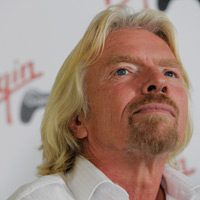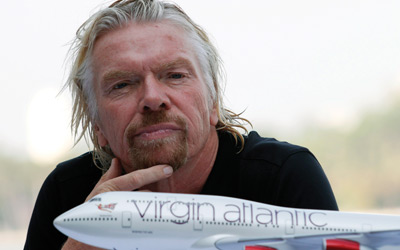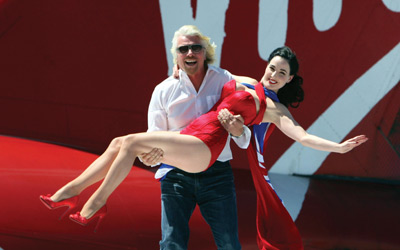 We focus on Richard Branson’s megabrand Virgin that continues to expand globally and how he began his career whilst still at school.
We focus on Richard Branson’s megabrand Virgin that continues to expand globally and how he began his career whilst still at school.
Richard Branson – who became Sir Richard in 1999, when he was knighted for services to entrepreneurship – has made his mark in the world through the all-encompassing global brand Virgin. The construction of such a prestigious business demanded commitment, attention to detail, and most importantly a willingness to succeed, and as a result of these attributes he has lucratively expanded the brand from its modest commencement.
Born in 1950 Branson went on to attend Stowe School, where the education system became the drive behind his ambition – not in terms of the strive for qualifications, but rather his interest in the environment of Stowe School itself. Aged 16, he created a magazine Student – which sought to target students rather than schools, as he was interested in connecting individuals. Although for many, the learning disability dyslexia can prove inhibiting, Branson used it to his advantage, as a catalyst for success: it caused him to develop aptitudes that relied on business acumen, rather than the skills needed to pass memory and IQ tests, and shaped him into the international entrepreneur he is today.
Running the magazine from his basement and with a small financial injection of four pounds from his mother, Branson – with the help of friend Jonny Gems – began business. He managed to arrange a cover picture of a student drawn by Peter Blake, designer of the Beatles’ Sergeant Pepper album cover, who also agreed to give an interview for the publication. The headmaster of Stowe said of Sir Richard at the time: “I predict that you will either go to prison or become a millionaire.” Such a forecast was a fitting surmise of Branson’s blossoming entrepreneurial skill and risk-taking nature.
In 1970, Virgin was established in similarly humble beginnings as a mail order record retailer with his associate Nik Powell. Building on the success of his start-up venture, Branson opened a record shop in Oxford Street, London.Two years later, furthering his interest and investment in the music business, Branson built a recording studio in Oxfordshire where the first Virgin artist, Mike Oldfield, recorded his debut album Tubular Bells, an early marker of the company’s development. From this initial recording, the record company continued to grow. In 1977, having signed the Sex Pistols, Branson and Powell went on to sign many names in music from the relatively unknown Culture Club to the renowned Rolling Stones and it is from this platform that the Virgin brand was propelled.

The Virgin Group has now moved into areas such as travel, leisure, TV, finance, health and radio. The key item that links these products and services is the power of the Virgin brand and its intrinsic relationship with Richard Branson. It is his entrepreneurial ability that sets his business apart, something that he was keen to establish from the outset, stating “I want Virgin to be as well-known around the world as Coca-Cola.”
Sir Richard does not only focus on the commercial benefits of the Virgin Group but also concentrates on the impact his business – as well as other large industrial corporations – may have on the environment. The Virgin Earth Challenge seeks to challenge these damaging effects and encourage individuals or companies to propose viable advancements that will enable the removal of greenhouse gases from the atmosphere with a £15 million prize available.
Furthermore, Sir Richard has established Virgin Unite, the non-profit foundation of the Virgin Group in conjunction with Nelson Mandela. The owner of Virgin is also associated with Mandela through The Branson Centre of Entrepreneurship (BcoE), established in 2006, which provides opportunities for young South Africans to establish businesses, which they otherwise would not have access to. The BcoE provides guidance and mentoring from the experience of skilled individuals in order to generate business growth in South Africa to positive effect.
It seems there is not a stone left unturned by Branson’s business kingdom. He has even conquered space with the most ambitious branch of the brand, Virgin Galactic. Virgin Galactic’s first Burt Rutan-engineered spacecraft, The Enterprise, completed its initial captive carry (a flight of parasite aircraft configuration consisting of a carrier aircraft and a spaceplane) in March 2010. Sir Richard projects it will begin carrying passengers into space in 2012, with an estimated ticket price of £120,000. However, Sir Richard as a magnate realises that running a business is not always easy and that a large part of entrepreneurial skill is recognising mistakes and being able to rectify them: “Occasionally we’ll come unstuck and you know, we’ll learn from our mistakes but so far I think we’ve managed to get it right more often than we’ve got it wrong.”

In 2010, Sir Richard appropriately returned to the sphere of magazine publishing where he began to exercise his entrepreneurial flair: “I wasn’t really interested in becoming an entrepreneur, but I soon found I had to become an entrepreneur in order to keep my magazine going.” The scale and form of the publication has dramatically shifted with his recent offering PROJECT, an iPad-only magazine. It represents the digital future of publishing, covering areas such as business, technology and fashion and boasts cover stars such as Jeff Bridges, Tinie Tempah and Eric Bana. It marks a collaboration between Virgin Digital Publishing and Seven Squared (a strategic content agency) and demonstrates how far he has come in terms of publication proportion and technological advancement since the promising days of Student magazine.
Not satisfied with conquering the business world, in 1986 Branson set his sights on the record books, beating the world record for the fastest crossing of the Atlantic Ocean in the Virgin Atlantic Challenger. His belief is that “Records are made to be broken. It’s in man’s nature to continue to strive to do just that.” In 2008 – true to this conviction – he sought to sail the Atlantic by yacht but had to admit defeat due to harsh weather conditions – but this has far from dampened spirits, as at the time of writing he is planning a charity swim of the Irish Sea.
Sir Richard has truly succeeded in creating a megabrand – which he maintains through the unfailing attention he pays to every area of his empire – with over 300 branded companies and global revenues in 2009 exceeding £11.5 billion. It is Sir Richard’s determination, care and consideration spanning from his initial venture in the music industry up to his quest into space that has enabled him to succeed.
This article was first published in Careers with Hayley Taylor in August 2011. [Read the digital edition here]
Image: PA Photos


